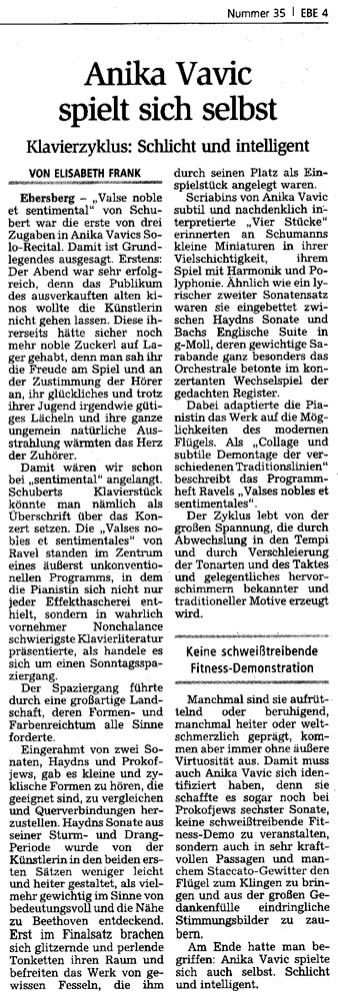Press
12. 02. 2004
Anika Vavic Plays Herself
Piano Cycle: Simple and Intelligent
Ebersberg - Valse noble et sentimental by Schubert - that was the first of the three encores Anika Vavic played after her solo recital. This says something very fundamental. First of all: it was a very successful evening, because the audience in the sold out "altes kino" did not want to let the artist go. She, in turn, would surely have had more noble treats, so visible was the joy she brought to her playing, and the fact that her audience agreed with her was reflected in her happy smile that seemed wise in spite of her youth. Her entire very natural charisma warmed the hearts of her listeners.
And that brings us to "sentimental". Schubert's piano piece could have been the motto for the entire concert. The Valses nobles et sentimentales by Ravel formed the centerpiece of an extremely unconventional program, during which the pianist not only avoided any kind of razzle-dazzle, but presented some of the hardest piano literature with aristocratic nonchalance, as if it were a stroll in the park.
This stroll lead us through a grand landscape, which challenged all the senses with its variety of form and colors.
Framed by two sonatas by Haydn and Prokofiev, there were smaller and cyclical pieces to be heard, suitable for making comparisons and discovering connections. The first two movements of the Haydn sonata were not presented by the artist in a light and happy mood, but rather gravely and full of meaning, emphasizing the proximity to Beethoven. Only in the final movement did brilliant and pearly rows of notes take over, freeing the piece from a certain restraint that may have been due to the work's placement as the first piece on the program.
Anika Vavic's subtle and thoughtful interpretation of Scriabin's Four Pieces was reminiscent of Schumann's miniatures with their complexity, their harmonic games and flirting with polyphony. They were embedded almost like a lyrical second sonata movement between the Haydn sonata and Bach's English Suite in G Minor, the Sarabande of which emphasized the orchestral nature of that work in the interplay of imaginary registers.
The pianist adapted the work to the possibilities of a modern grand piano. The program notes described Ravels Valses nobles et sentimentales as a "collage and subtle dismantling of the various traditional lines".
The essential element of the cycle is the enormous tension that is created by the changing tempi and the obfuscation of the harmonies and measure structures, as well as the occasional glimpses at known and traditional motives.
Sometimes they are arousing and sometimes calming, some are happy and some world-weary, but they are all devoid of exterior virtuosity. Anika Vavic must have identified with that fact, because she managed to avoid any demonstration of sudorific fitness, even in Prokofiev's sixth sonata. Instead, she wrought a beautiful sound from the piano even in the very forceful passages and staccato salvos of the piece, and conjured vivid imagery from the great multitude of thoughts and motives.
In the end, one understood: Anika Vavic was playing herself, too. Simply and intelligently.
Translation: Alexa Nieschlag
[ original article ]
